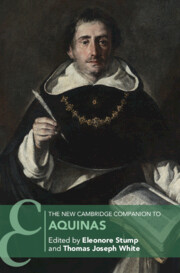Book contents
- The New Cambridge Companion to Aquinas
- Other Volumes in the Series of Cambridge Companions
- The New Cambridge Companion to Aquinas
- Copyright page
- For our teachers
- Contents
- Contributors
- Abbreviations
- A Select List of Aquinas’s Works
- Introduction
- Part I Life and Works
- Part II Metaphysics and the Ultimate Foundation of Reality
- 2 First Principles
- 3 Essence and Existence, God’s Simplicity and Trinity
- 4 Goodness and Being, Transcendentals, Participation
- 5 The Metaphysics of Creation
- 6 The Nature of Human Beings
- Part III Epistemology
- Part IV Ethics
- Part V Philosophical Theology
- Bibliography
- Index
- Other Volumes in the Series of Cambridge Companions (continued from page ii)
3 - Essence and Existence, God’s Simplicity and Trinity
from Part II - Metaphysics and the Ultimate Foundation of Reality
Published online by Cambridge University Press: 30 July 2022
- The New Cambridge Companion to Aquinas
- Other Volumes in the Series of Cambridge Companions
- The New Cambridge Companion to Aquinas
- Copyright page
- For our teachers
- Contents
- Contributors
- Abbreviations
- A Select List of Aquinas’s Works
- Introduction
- Part I Life and Works
- Part II Metaphysics and the Ultimate Foundation of Reality
- 2 First Principles
- 3 Essence and Existence, God’s Simplicity and Trinity
- 4 Goodness and Being, Transcendentals, Participation
- 5 The Metaphysics of Creation
- 6 The Nature of Human Beings
- Part III Epistemology
- Part IV Ethics
- Part V Philosophical Theology
- Bibliography
- Index
- Other Volumes in the Series of Cambridge Companions (continued from page ii)
Summary
The aim of this chapter is to introduce Aquinas’s account of ultimate explanations in metaphysics. What are the constituent principles of created reality? What do they indicate about God in his unique existence, nature, and divine simplicity? How may one reasonably understand the Christian doctrine of the Trinity in light of the affirmation of divine simplicity? To consider these questions I will proceed in three stages, examining first Aquinas’s distinctive claims regarding the distinction of essence and existence in creatures; second his interpretation of the traditional Christian affirmation that the divine nature is simple; and third his concept of Trinitarian persons as subsistent relations, a teaching that helps illustrate the logical compatibility of Aquinas’s Trinitarian theology, his doctrine of God, and his metaphysics of creaturely composition.
- Type
- Chapter
- Information
- The New Cambridge Companion to Aquinas , pp. 57 - 84Publisher: Cambridge University PressPrint publication year: 2022

